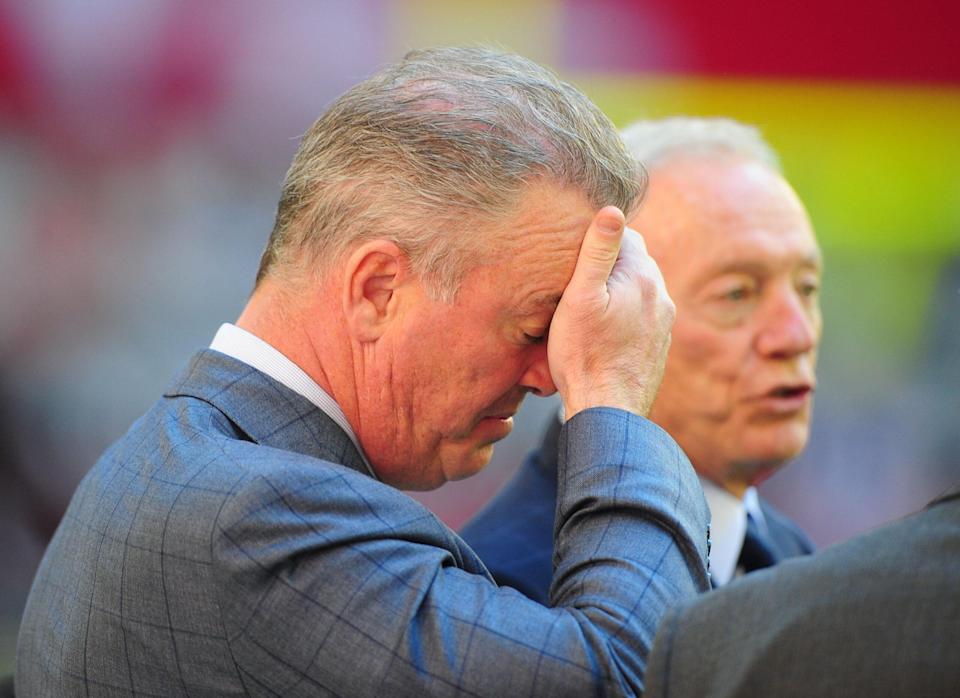
The Dallas Cowboys are about to hit free agency with a bang, but is the metaphorical gun aimed at their own players? Paying their own before investing in outside free agents has been the mantra for about a decade now as executive VP and COO Stephen Jones has taken over more control of the money decisions form his father and owner, Jerry Jones.
Fans of the team are not necessarily fans of the philosophy. The Cowboys are rarely aggressive with top-tier free agents who could help improve and get Dallas over the divisional round playoff hump. It has been 10 years since the organization has spent big money on an outside free agent on a long-term deal.
Cornerback Brandon Carr holds that distinction when he got a five-year, $50.1 million deal with $26.50 guaranteed and a signing bonus of $10 million. The Cowboys also added defensive end Greg Hardy to a $13.1 million deal in 2015, but that was just for one year and had insulation from the inevitable blow up.
Since then, however, the Cowboys have rarely gone above $5 or $6 million a year to any outside free agent, and those are usually short-term contracts. Wide receiver Allen Hurns got a two-year, $12 million deal in 2018, while another WR, Randall Cobb, got a one-year deal worth $5 million in 2019.
In 2020, the Cowboys did use a few more cap dollars on outside free agents, defensive end Everson Griffen got $6 million for one-year, defensive tackle Dontari Poe got $10.5 million over two years and fellow DT Gerald McCoy topped out at $18.3 million for three years. None of those players finished the 2020 season or saw a second year with the team.
Last offseason free agency saw just one big signing, safety Keanu Neal for $5 million and one year.
These are all among the biggest deals the Joneses doled out in the last 10 years and there isn’t a real difference maker among them. Instead of investing in top-tier guys to fill holes on the roster with long-term options, the Cowboys have gone cheap and short. The corresponding results have not been surprising.
This offseason, here Dallas sits, needing to make tough decisions to get under the cap and trying figure out how to put the best product on the field. It’s hard to fathom how that happens without wide receiver Amari Cooper and defensive end DeMarcus Lawrence, who was asked to take a pay cut by the team.
The Cowboys are not a better team without either Cooper or Lawrence. Couple this with the team reportedly releasing one of their better offensive players to keep wide receiver Michael Gallup and/or tight end Dalton Schultz, both of whom Cooper has outperformed, is difficult for many to understand.
The same applies to Lawrence, who might be cut to re-sign fellow defensive end Randy Gregory. Lawrence is a more complete player than Gregory.
It boggles many a mind the way the Cowboys approach team building. The Cowboys love to say they pay their own, but on many occasions, it takes them too long to do so, driving the price up. It took the franchise two extra years to pay quarterback Dak Prescott and wound up paying more than they likely would have when they extended him last offseason. They took the same path a few years earlier with Lawrence, who was forced to “prove it” before he got a long-term deal. Wide receiver Dez Bryant was in the same boat before that.
To compound the issue, too many times after they overpay they end up releasing the player before that new contract runs its course.
DE DeMarcus Ware – 2009: Six-years, $78 million with a $20 million signing bonus and $40 million guaranteed. Ware played five years of the deal, which was for a total of seven years because it was an extension.
QB Tony Romo – 2013: Six-years, $108 million with a $25 million signing bonus and $40 million guaranteed. Romo lasted just four of those six years.
WR Dez Bryant – 2015: Five-years, $70 million, with a $20 million signing bonus and $23 guaranteed. Bryant lasted just three of those five years.
LB Jaylon Smith – 2020: Five-years, $64 million, with $35.5 million guaranteed. Smith lasted six weeks into the second season.
If the Cowboys rid themselves of Cooper and Lawrence add two more to that group.
The only players who have lasted through their large contracts will be Sean Lee, signed in 2013, Tyron Smith, signed in 2014, and likely, Zack Martin, who was extended in 2018. The team can be forgiven for losing on Travis Frederick’s deal since he retired unexpectedly and tight end Jason Witten’s deals were always manageable, and he retired as well.
The returns on running back Ezekiel Elliott’s mammoth extension haven’t been great yet and he looks unlikely to play out his contract as well.
It’s not a great track record for the Joneses when it comes to negotiations and perhaps it’s time the Cowboys start to examine how they are doing business. Player acquisition and its cost is not something they’ve been very strong at over the last decade. With pseudo-GM Will McClay helping identify solid players who can help at a low cost, Dallas’ propensity for being a good drafting team, and having one of the better quarterbacks in the league, they should be regularly in contention for Super Bowls with a better strategy in paying for elite talent.
It’s been said ad nauseum for a long time, if the Cowboys got just a little aggressive at the right time and knew the value of their players, their fortunes might have been different. Keeping their good players earlier in their careers and signing a top-of-the-line free agent every now and then could have made a difference.
Instead, they run out the same philosophy year after year with a poor track record. If you know the definition of insanity, you will call the Cowboys insane.
